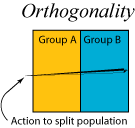
Suppose Group B is people who have committed violent crimes and Group A is everybody else. We will trust that in such an example the Group B box is actually much smaller. If 10% of the people were expected to have committed violent crimes, and based on that the government were to institute a program whereby lots were drawn and 10% of the population were imprisoned, we could be pretty sure that the effect of the action was orthogonal to the groupings. 90% of the guilty would remain free while 10% of the innocent would be imprisoned.
Of course many countries, including our own, do much better than that. But there are instances where the effect of a law or regulation may be more orthogonal to the intended effect than most are willing to admit. And when the unscrupulous gain power, there is even a danger that the effect will be worse than orthogonal, and the meritorious are more likely to receive punishment while the transgressors are protected. I fear that punishment in far too many dictatorships can be worse than orthogonal for some transgressions. Of course even the worst leaders want to subdue the murderers in their populace when their murders don't serve the ends of the dictator. But orthogonality is a useful concept for far more than just regulation and justice.
No comments:
Post a Comment